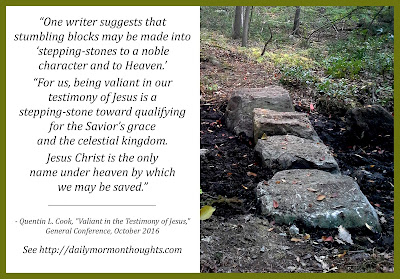"Have more patience with yourself—more self-understanding. I would plead that we understand it is not our role to be self-condemning. I like to think when we are taught 'Judge not, that ye be not judged,' that it has direct reference to us and our relationship with ourselves. We should not judge ourselves. We should teach ourselves patience—patience to believe in ourselves, patience to motivate ourselves, patience to believe that God and I can do it. When necessary, lean on the truth 'I am a child of God.' God and I, with patience on my part, can do it.
"I remind you we do not have to worry about the patience of God, because he is the personification of patience, no matter where we have been, what we have done, or what we, to this moment, have allowed ourselves to think of ourselves. Two of Satan's greatest tools today are spreading impatience and discouragement. Drugs, moral misconduct, violent protest are merely evidences of internal impatience on our part....
"I share with you this morning, my young friends, this fact. When you have hours and days of a feeling of inadequacy, when you are inclined to say, 'I don't have much going for me; no one cares about me,' I bear witness to you that an eternal truth of the gospel of Jesus Christ is the value of the individual. God will not forsake you."
- Marvin J. Ashton, "Patience Is a Great Power," BYU devotional, February 13, 1973
Click here to read the full article
Are we sometimes too "self-condemning"? Elder Ashton warns that we may have the tendency to judge ourselves too harshly, focusing on our shortcomings and struggles and letting our impatience block our progress. But he reminds us that we never need to be alone in the struggles we face:
It was interesting that Elder Ashton identified two major tools used by Satan as "spreading impatience and discouragement." We want results fast, and get annoyed when we have to wait; or we lose hope.
Elder Ashton's strong witness was of the "eternal truth of the gospel of Jesus Christ" that each individual has great value to God, and will never be left alone in the midst of trials. We need only remember that and turn to Him for help!


































